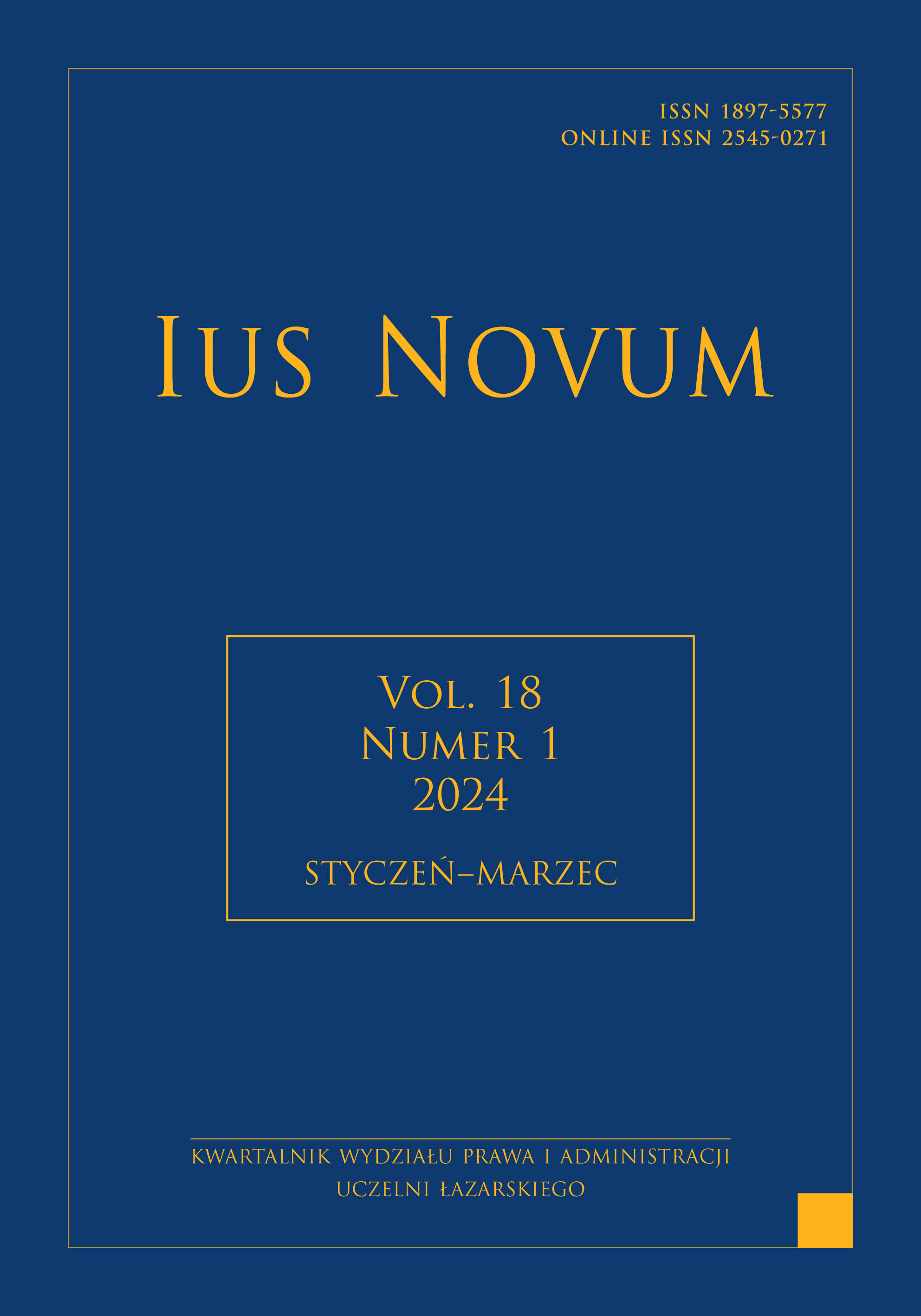Abstract
The subject of this study is the criminal law issue of the exploitation of prostitution practised by humanoid robots. The interest in this issue stems from two reasons. Firstly, the development of new technologies, including artificial intelligence, capable of self-education, analysis of the surrounding reality and decision-making makes it necessary to consider its legal subjectivity. Secondly, the phenomenon of the emergence of brothels with humanoid robots prompts reflection on the criminal responsibility of those who benefit from prostitution by them. The aim of the article is to signal the phenomenon of the use of humanoid robots in the prostitution procedure, a criminal law assessment of such behaviour from the point of view of Polish criminal law and an attempt to indicate the perspective of the development of domestic criminal law, which should take into account such a phenomenon in the future. Also related to the presented issue is the question of criminal liability for harm caused by a humanoid robot equipped with artificial intelligence in the course of providing sexual services. The article uses primarily the dogmatic-legal method, carrying out an exegesis of the provisions of Article 204kk in the context of the issue signalled in the title. The analyses carried out have led to the conclusion that this norm does not cover the situation in which the perpetrator facilitates, induces prostitution of a humanoid robot or derives financial benefits from such a procedure, despite the fact that such behaviour is detrimental to morality, which is the basic good protected under article 204kk. De lega lata, a humanoid robot may also not be subject to criminal liability in the event of harming a person using his/her sexual services, after all, such “essence” does not correspond to the currently accepted structure of the crime and the concept of criminal punishment. In contrast, the liability of the manufacturers or users of such devices is not excluded. However, it should be noted that the more humanoid robots become autonomous in their behaviour, the less justifiable it will be to hold producers or users criminally liable for the damage they cause, and the more up-to-date the liability of artificial intelligence along the lines of the criminal liability of legal persons will become.
References
Antoniszyn M., Marek A., Prostytucja w świetle badań kryminologicznych, Warszawa 1985.
Auleytner A., Czy robot może ponieść odpowiedzialność karną, „Prawo i Normy” 2017, nr 12.
Bielski M., w: Kodeks karny. Część szczególna. Tom II. Komentarz do art. 117–211a, red. W. Wróbel, A. Zoll, Warszawa 2017.
Budyn-Kulik M., w: Kodeks karny. Część szczególna. Tom II. Komentarz do art. 117–221, red. Królikowski M., Zawłocki R., Warszawa 2023 (Komentarz do art. 204 k.k., Teza 5, Legalis 2023).
Filipkowski W., Prawo karne wobec sztucznej inteligencji, w: Prawo sztucznej inteligencji, red. L. Lai, M. Świerczyński, Warszawa 2020.
Charkowska K., Zjawisko prostytucji w doświadczeniach prostytuujących się kobiet, Kraków 2010.
Giannini A., Kwik J., Negligence Failures and Negligence Fixes. A Comparative Analysis of Criminal Regulation of AI and Autonomous Vehicles, „Criminal Law Forum” 2023, nr 34.
Hallevy G., The Criminal Liability of Artificial Intelligence Entities – From Science Fiction to Legal Social Control, „Acron Intellectual Property Journal” 2016, vol. 4, iss. 2, art. 1.
Hilgendorf E., Introduction: Digitalization and the Law – A European Perspective, w: Robotik und Recht. Digitalization and the Law, Baden-Baden 2018.
Hypś S., w: Kodeks karny. Komentarz, red. A. Grześkowiak, Warszawa 2020, Komentarz do art. 204, Teza 4, Legalis.
Jankowska-Prochot I., Odpowiedzialność karna a działalność autonomicznych robotów. Wyzwania w polskim i światowym dyskursie naukowym, w: Prawo jako projekt przyszłości, red. P. Chmielnicki, D. Minich, Warszawa 2022.
Kłączyńska N., w: Kodeks karny. Część szczególna. Komentarz, Warszawa 2014.
Kowalczyk-Jamnicka M., Społeczno-kulturowe uwarunkowania prostytucji w Polsce, Bydgoszcz 1998.
Radutniy O.E., Adaptation of Criminal and Civil Law in View of Scientific-technical Progress (Artificial Intelligence, DAO, and Digital Human), „Проблеми законності” 2019, Вип. 144.
Piórkowska-Flieger J., Tak zwane przestępstwa okołoprostytucyjne, w: Prostytucja, red. M. Mozgawa, Warszawa 2014.
Sobczak J., Odpowiedzialność za przestępstwa popełnione w sieci: czy można zgwałcić awatara?, w: Prawne i administracyjne aspekty komunikacji elektronicznej, red. J. Mazurskiewicz, P. Szymaniec, Wałbrzych 2018.
Sobczak J., Prostytucja w Internecie, w: Prostytucja, red. M. Mozgawa, Warszawa 2014.
Warylewski J., Nazar K., w: Kodeks karny. Komentarz, red. R.A. Stefański, Warszawa 2023, Komentarz do art. 204, Teza 2, Legalis 2023.
Warylewski J., w: Kodeks karny. Komentarz, red. R.A. Stefański, Warszawa 2015.
Warylewski J., w: System Prawa Karnego. Tom 10. Przestępstwa przeciwko dobrom indywidualnym, red. J. Warylewski, Warszawa 2016.

This work is licensed under a Creative Commons Attribution-NonCommercial-ShareAlike 4.0 International License.

